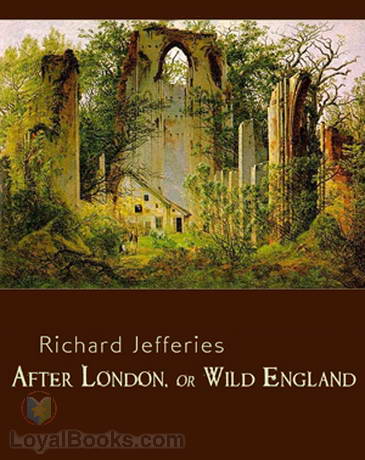
First published in 1885, After London, or Wild England is considered to be one of the earliest instances of post-apocalyptic fiction, describing the effects of an unspecified catastrophe that dramatically changes the face of England and its population. Divided into two parts, the first depicts the fall of civilization, as society reverts to its more primitive roots, while the second part is set years after the apocalyptic event and examines the evident changes in both natural scenery and social structure. In addition, Jefferies offers a remarkable portrait of the natural world with his colorful imagery and evocative descriptions, which highlight his enthusiasm and devotion to nature.
The first part of the novel begins with Jefferies’ description of a mysterious natural disaster that has taken its toll on England, and later goes on to provide a detailed account of the resurgence of nature in the aftermath of the dire calamity. Although the source of the disaster is not clearly distinguished, its effects on society and nature are immense, as the area has been substantially depopulated and engulfed by a newly formed lake. Slowly covering any traces of the industrial world, the land welcomes the return of wildlife to its unspoiled state, as trees, flowers, and plants begin to take over the area, while animals return to their feral states. Furthermore, the society that has remained reverts to its medieval roots, divided into tribal groups and a somewhat educated class. Subsequently, the novel shifts its focus to Felix Aquila, a dignified young man who sets out on a dangerous adventure, exploring the mystifying wilderness. In addition, Felix must face numerous predicaments along the way that test his durability and fortitude.
Presenting a unique take on a post-apocalyptic world, with a generous supply of botanical detail, After London, or Wild England served as an inspiration for many writers to follow in Jefferies’ footsteps and make a contribution to the post-apocalyptic genre. Interestingly, Jefferies effectively employs nature as the dominant feature in the novel, emphasizing its presence and influence in an altered landscape. Painting a vivid illustration of unspoiled nature and illustrating the gripping notion of natural reversion and the downfall of civilization, the novel is a sure to enthrall nature enthusiasts.

Other Audiobook
Audiobook: The Antiquities of the Jews
Antiquities of the Jews was a work published by the important Jewish historian Flavius Josephus
Audiobook: Adopting of Rosa Marie
In this charming girl’s book we meet again the four chums of Dandelion Cottage. Their
Audiobook: St. Clair’s Defeat 1791
St. Clair’s defeat was a battle fought between the United States and the Western Confederacy
Audiobook: Bees, Shown to the Children
A very good introduction to the bee, including its physical and behavioral characteristics. Most appropriate
Audiobook: Balder Dead (version 2)
The poem begins with the beloved god Balder, thought to be invulnerable, dead at the
Audiobook: Haunted Island
Being the History of an Adventure to an Island in the Remote South Sea. Of
Audiobook: Our Street
Written as an autobiographical sketch of a Mr. M.A. Titmarsh, Our Street is a tongue-in-cheek
Audiobook: Paddeltje, de scheepsjongen van Michiel de Ruijter
De avonturen van Klaas Ariensze, bijgenaamd Paddeltje, scheepsjongen van Michiel de Ruijter. Na een eerste
Audiobook: Jean-Christophe, Volume I
The central character, Jean-Christophe Krafft, is a German musician of Belgian extraction, a composer of
Audiobook: Short Story Collection Vol. 069
O. Henry, P.G. Wodehouse, Sir Arthur Conan Doyle, Dorothy Parker and Jack London were among
Audiobook: Birds, Vol. II, No 3, September 1897
Birds, Illustrated by Color Photography was a monthly publication of the Nature Study Publishing Company
Audiobook: Some Haunted Houses of England and Wales
Old buildings necessarily have a history. It is not always a happy history and folklore